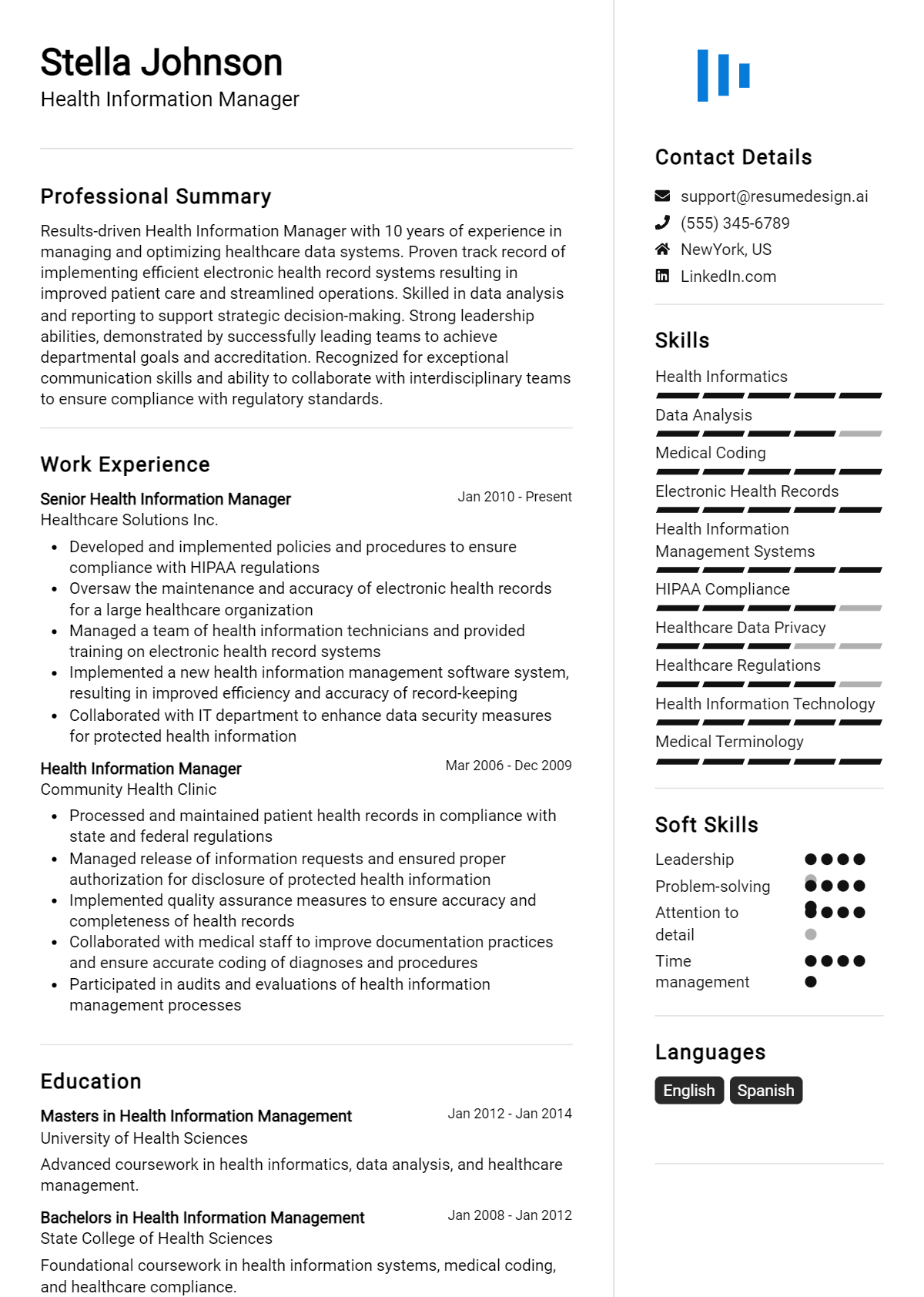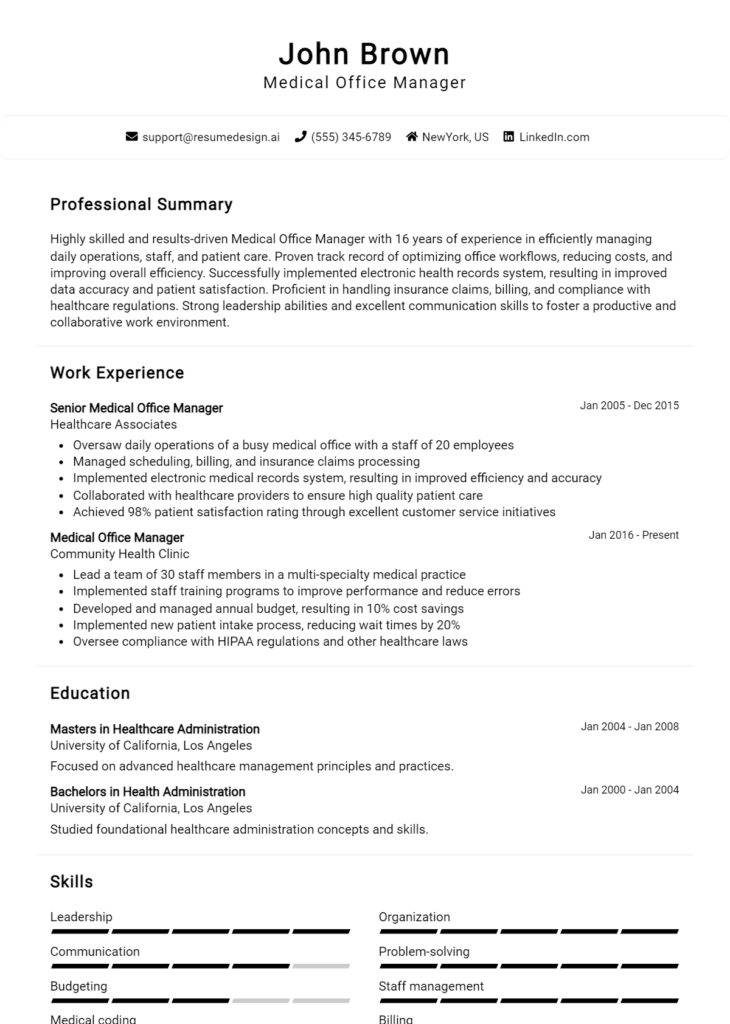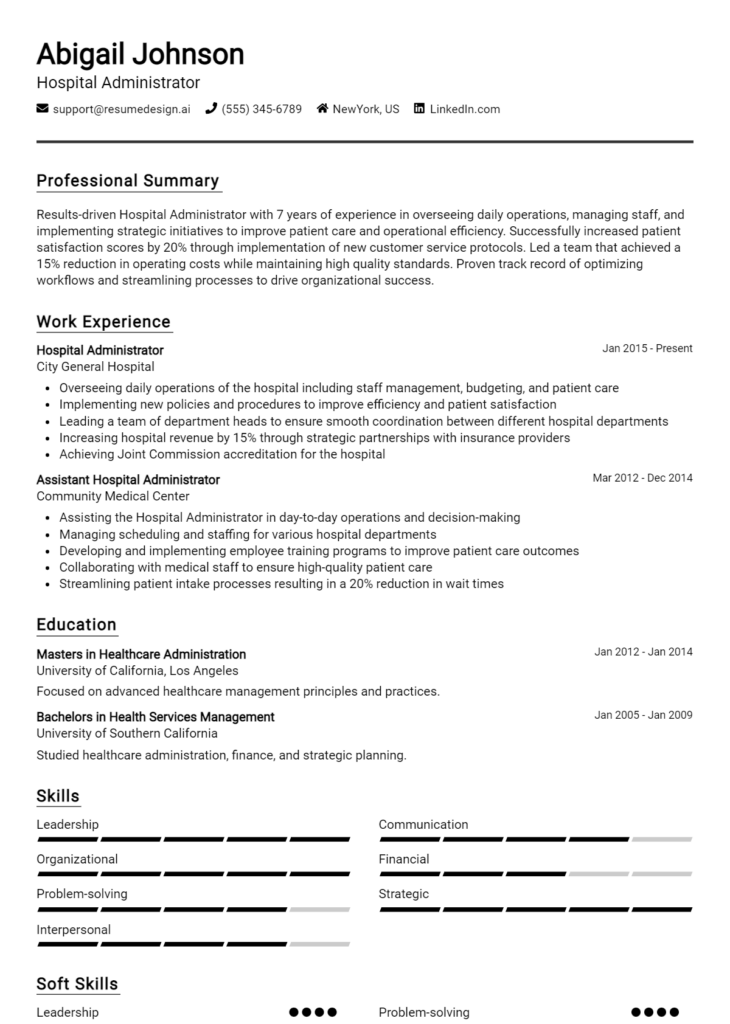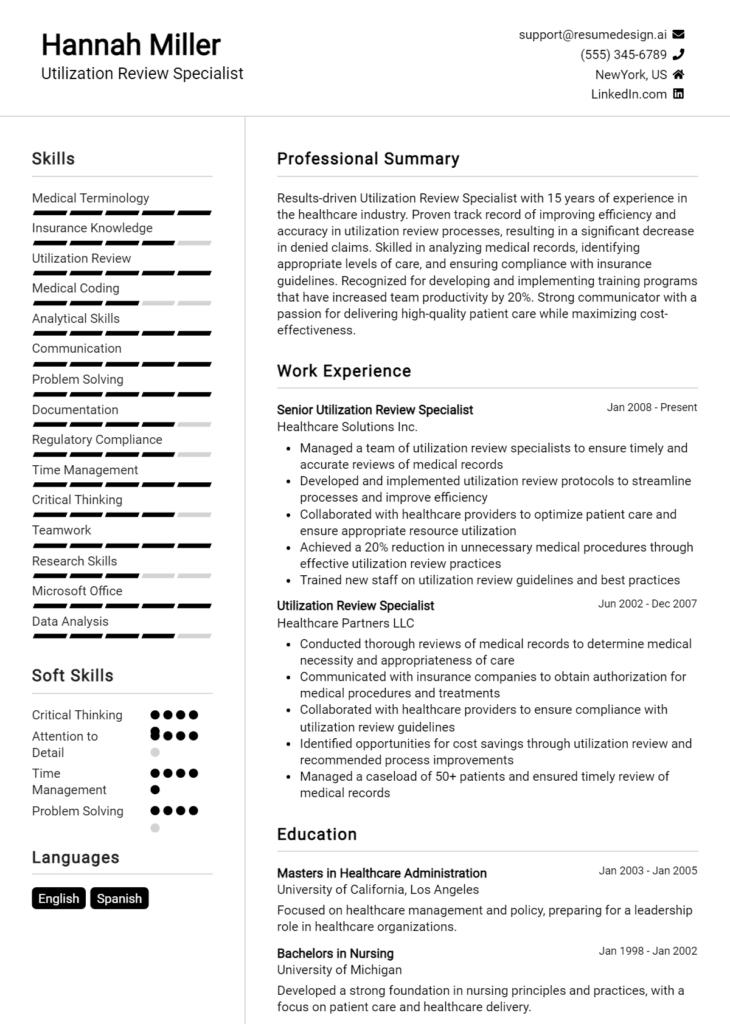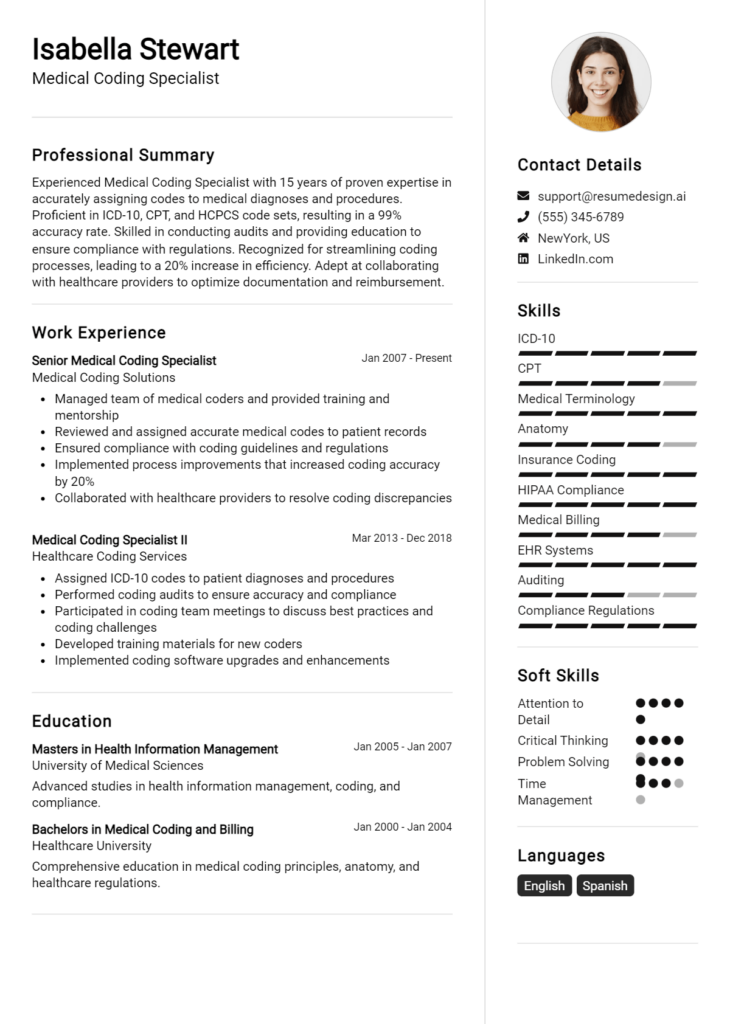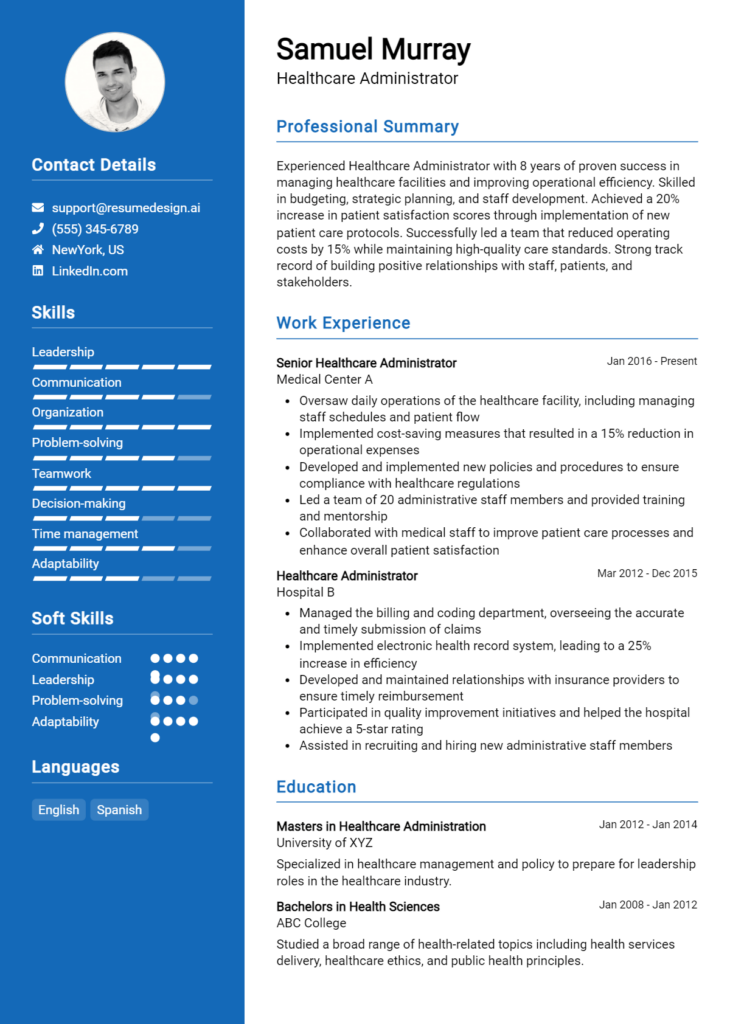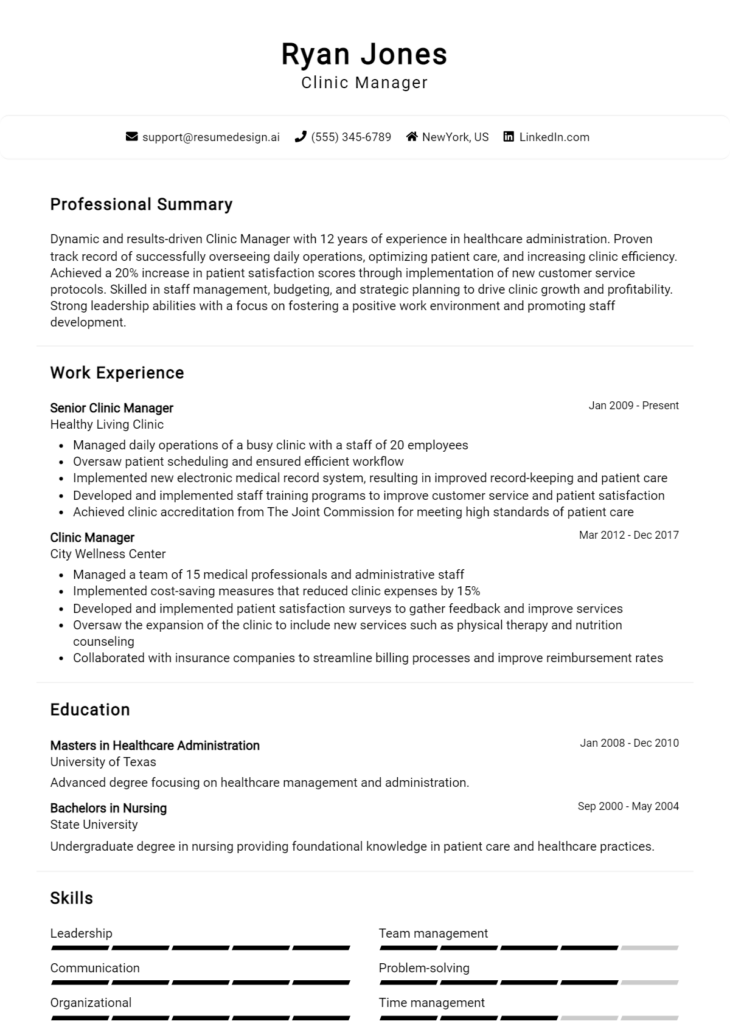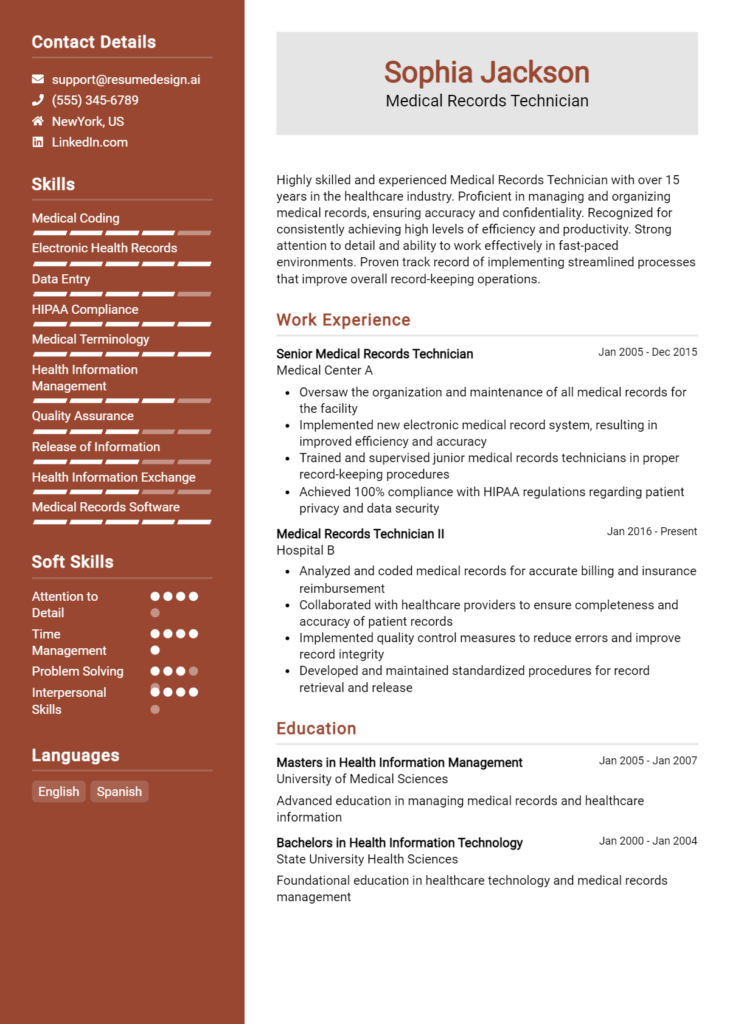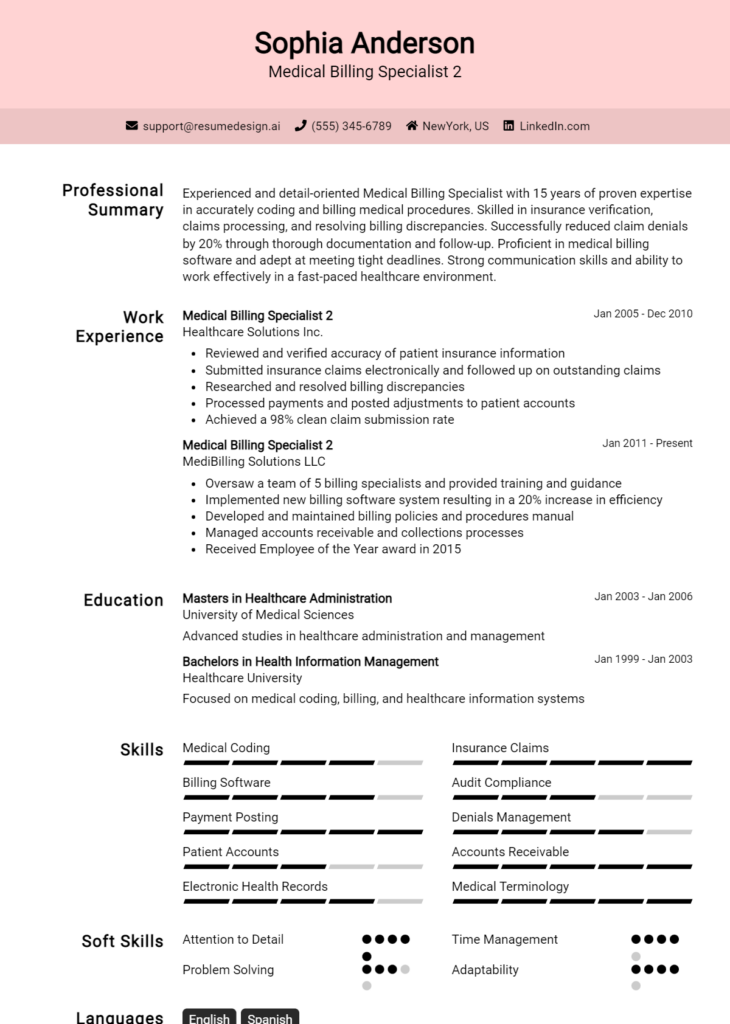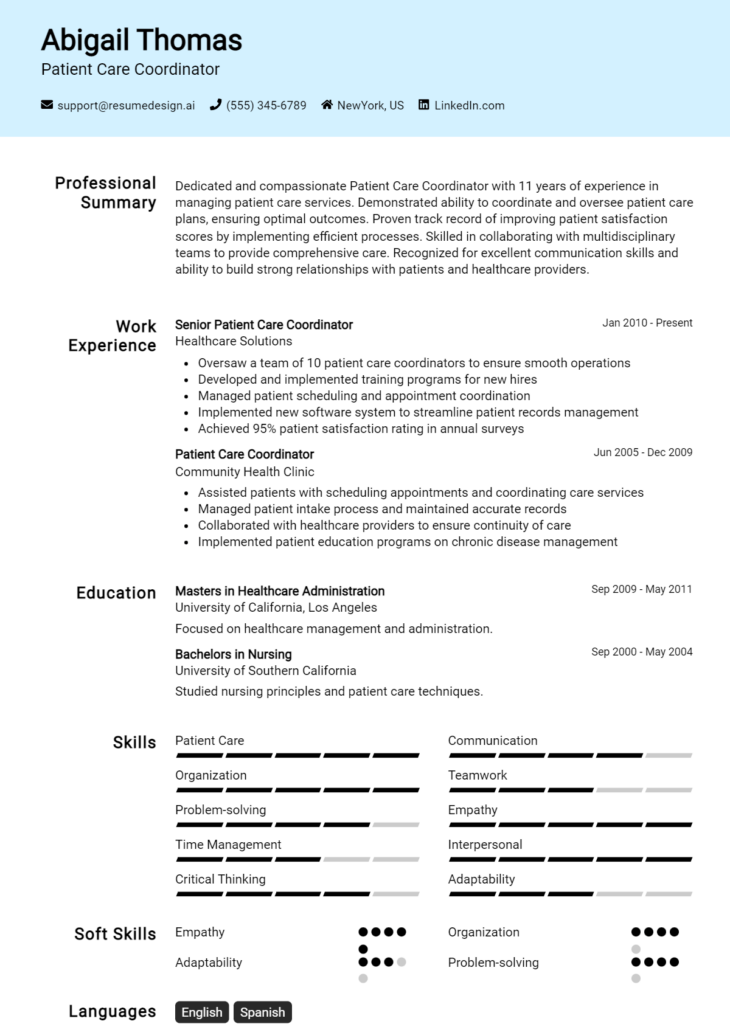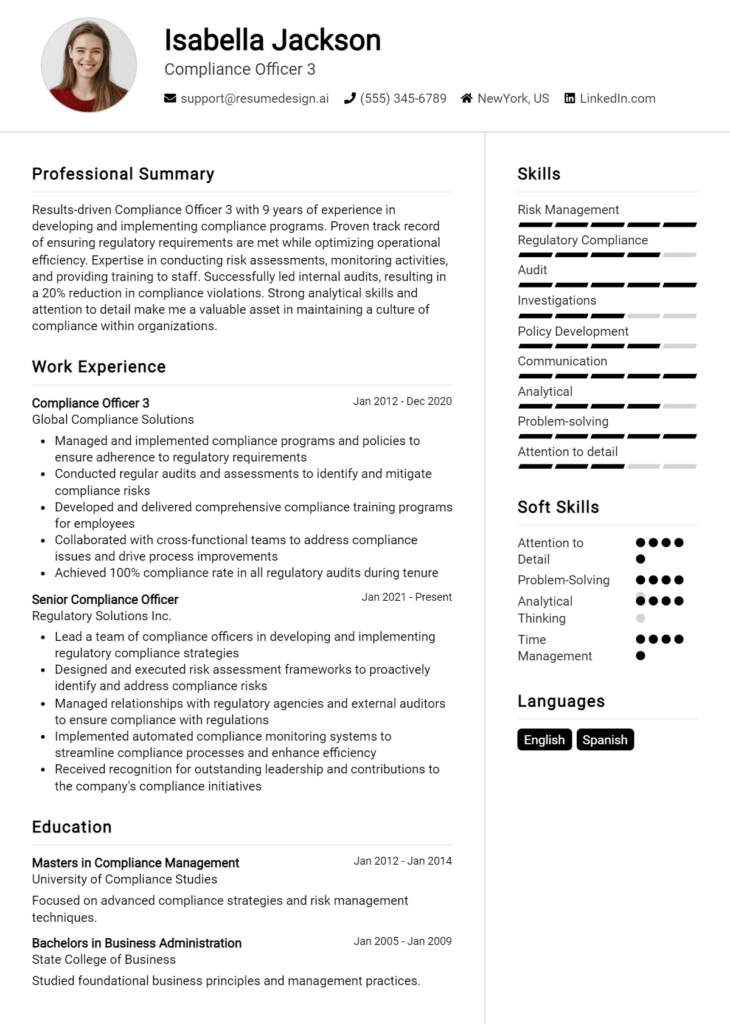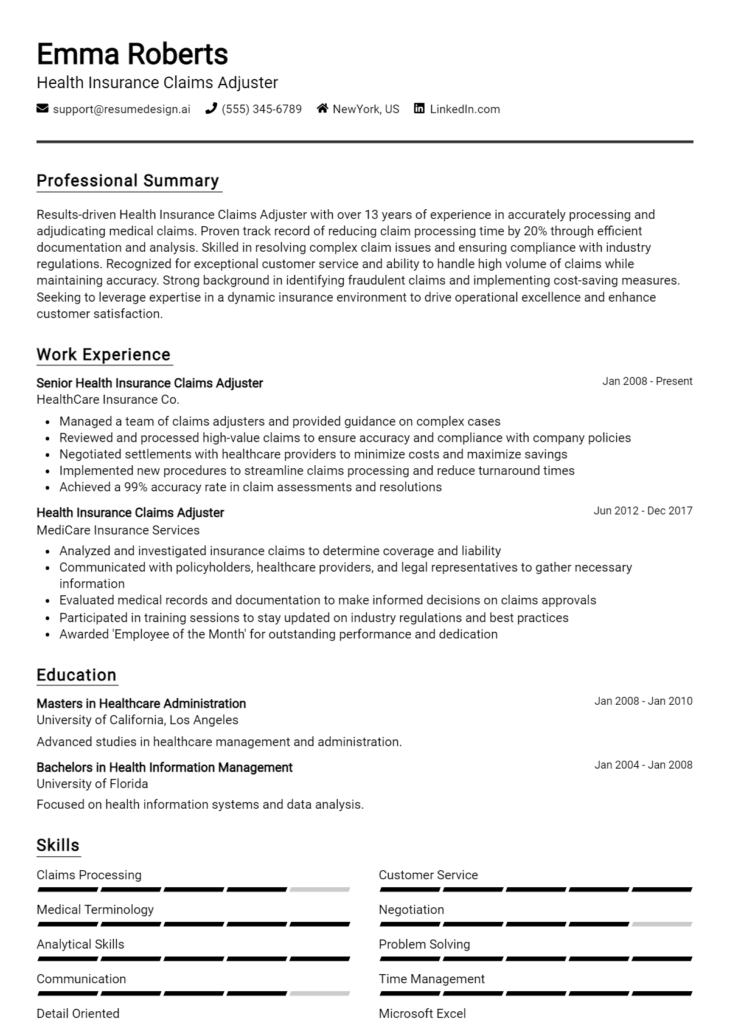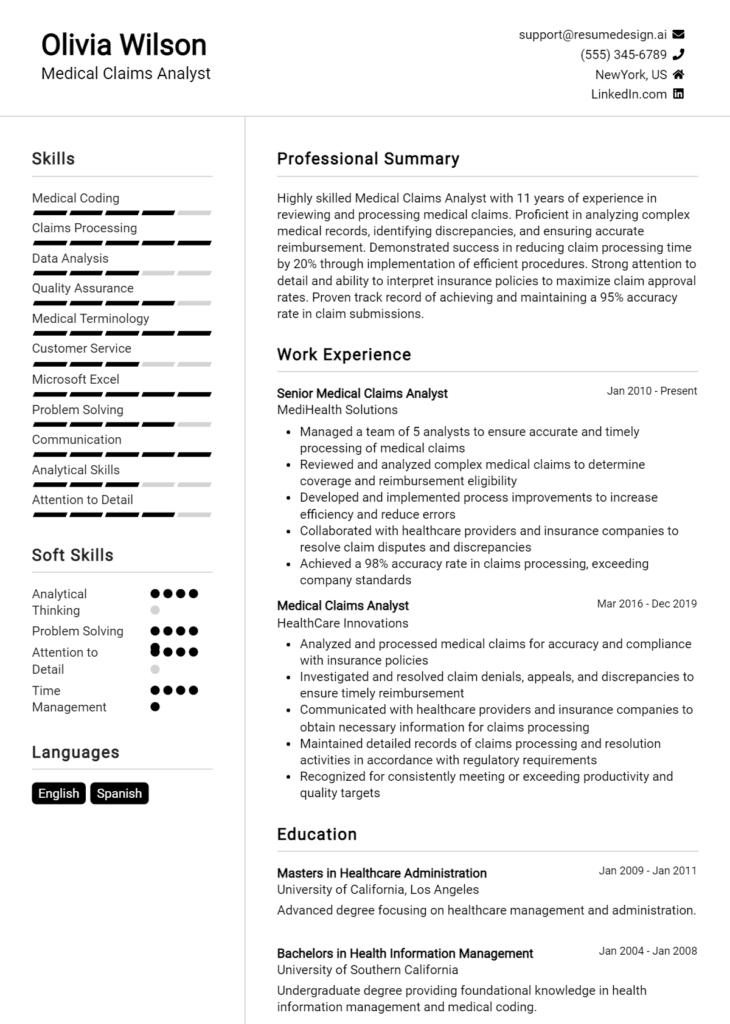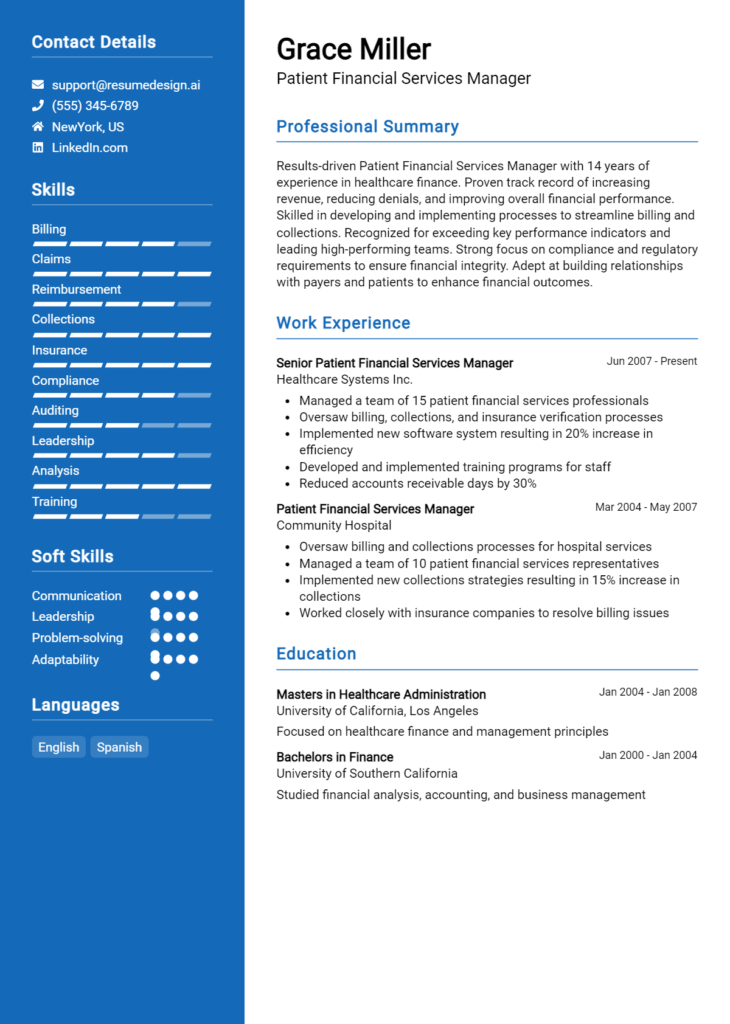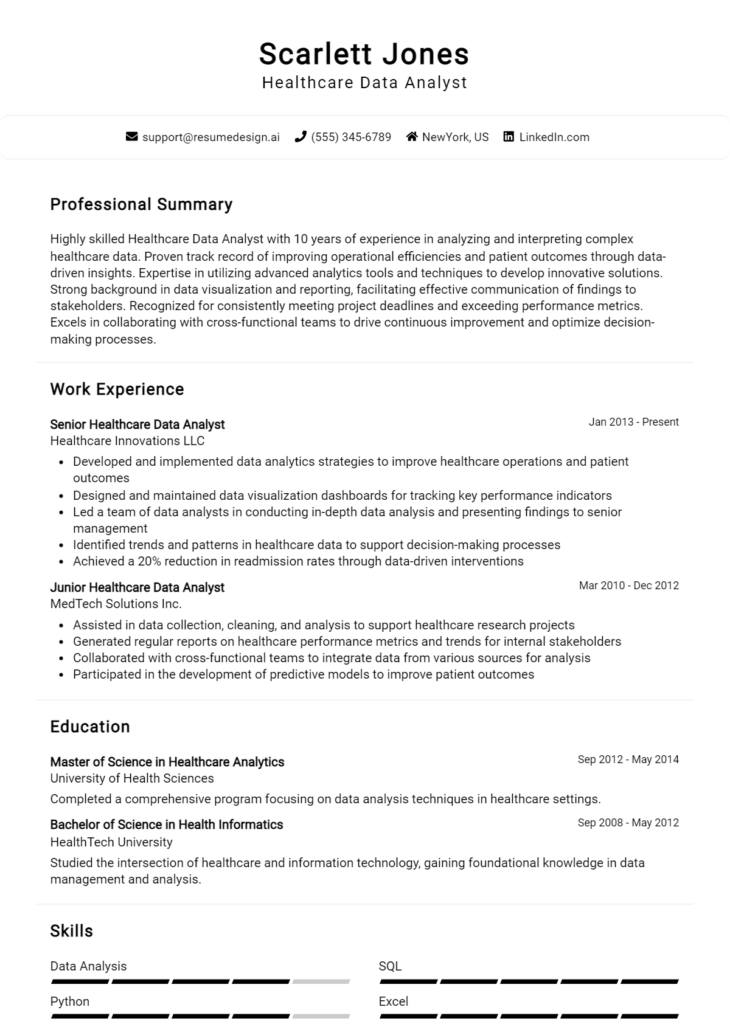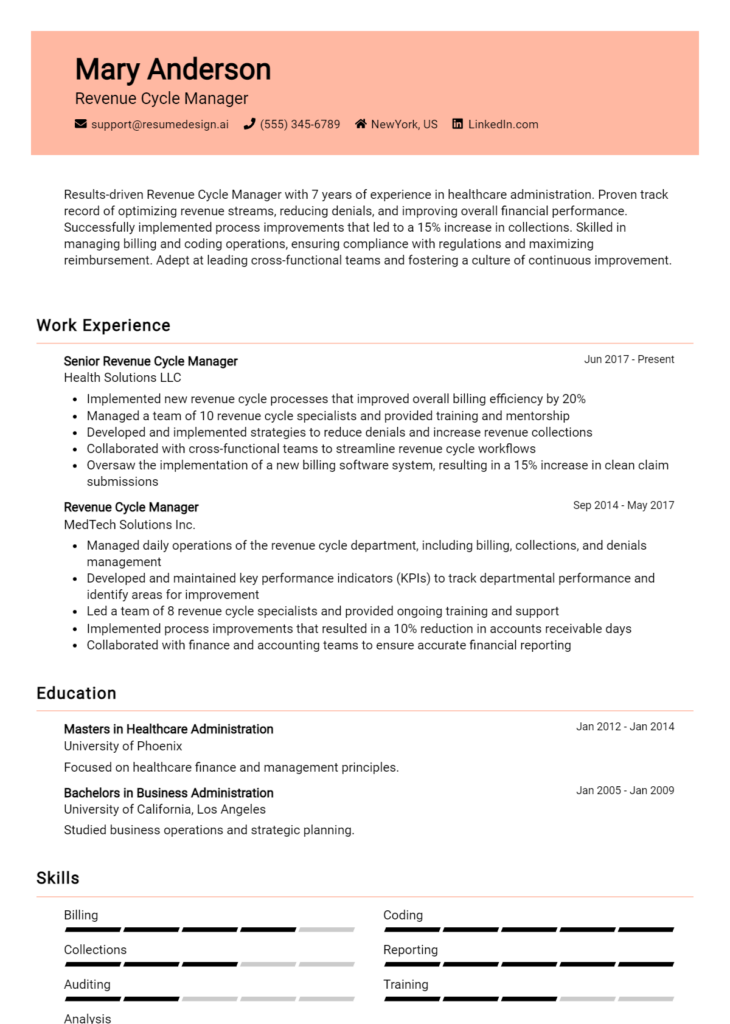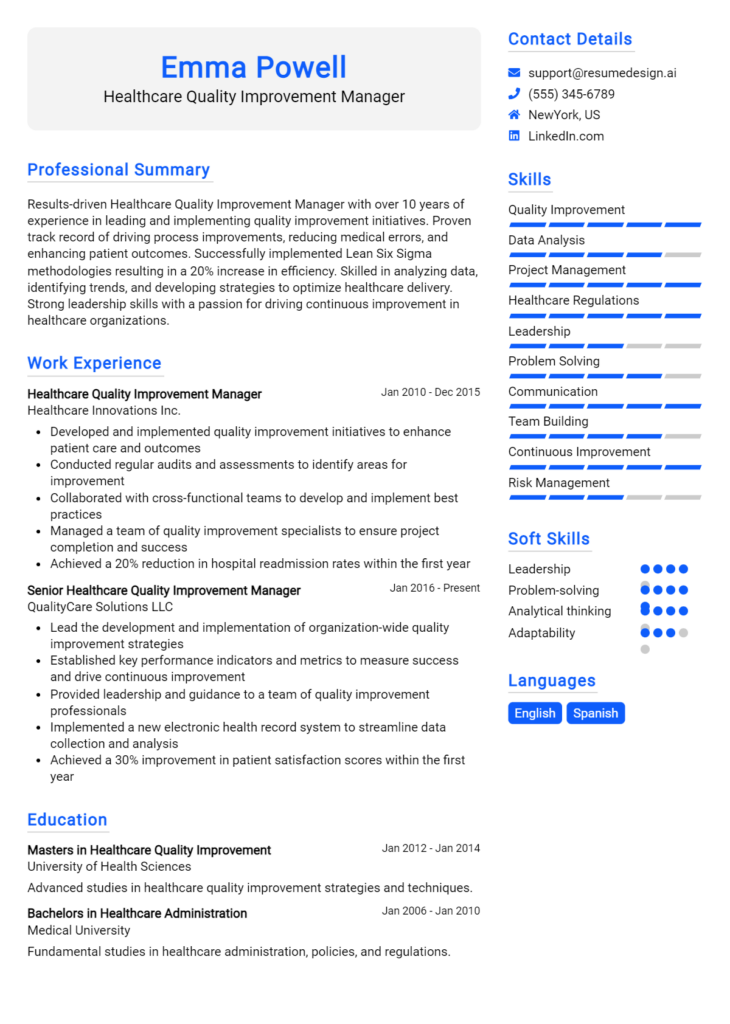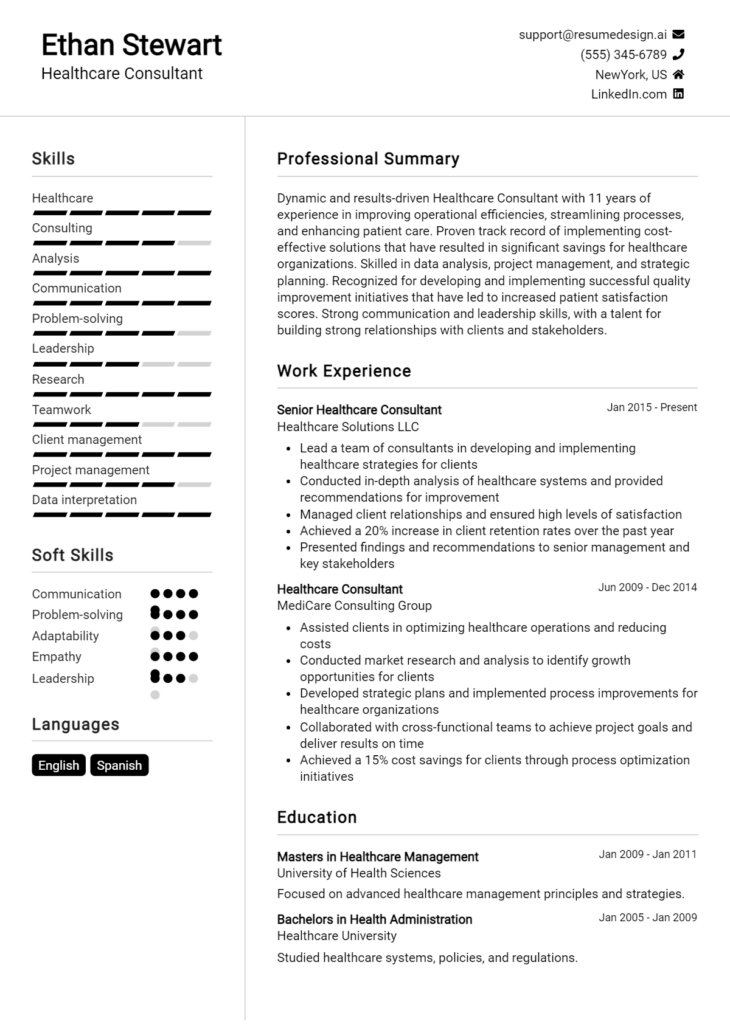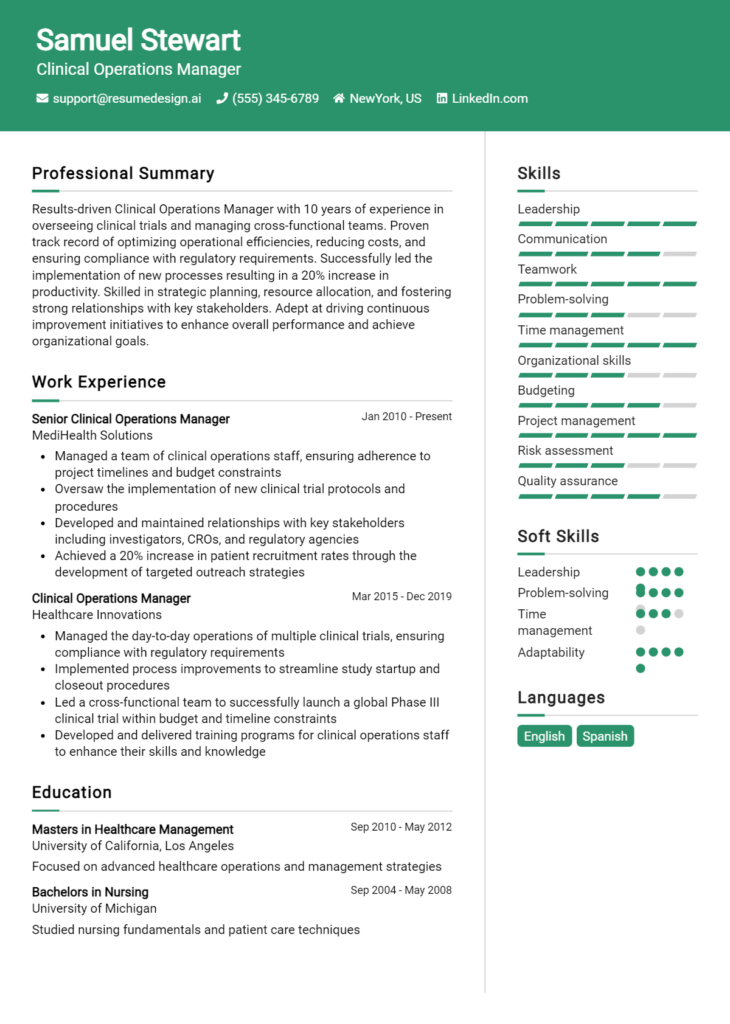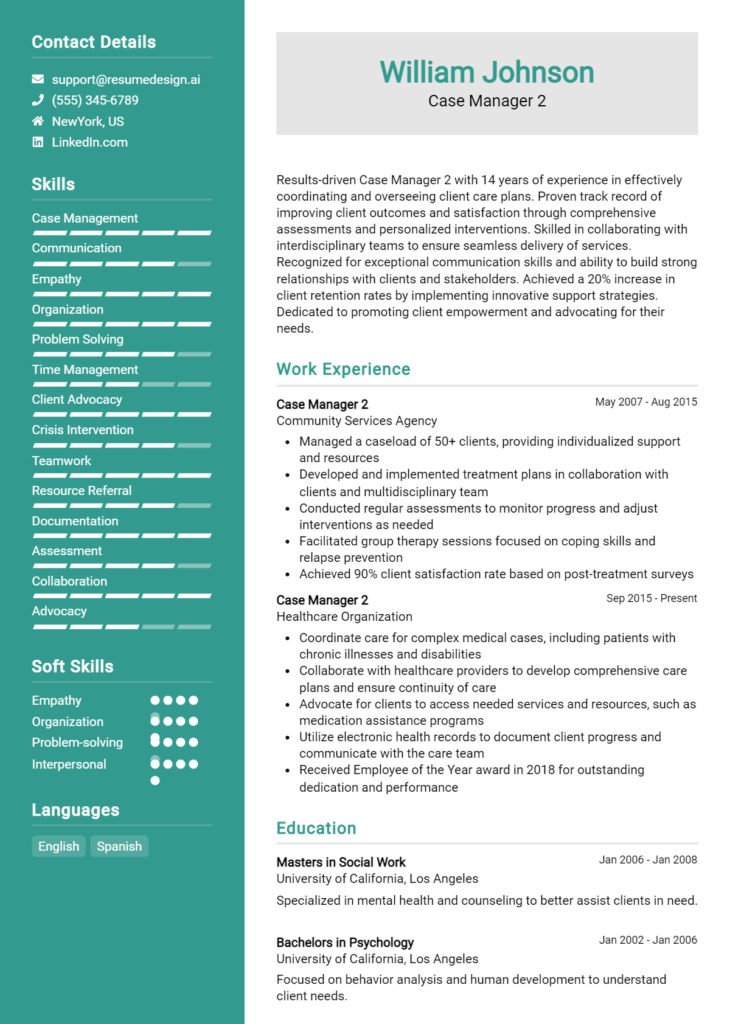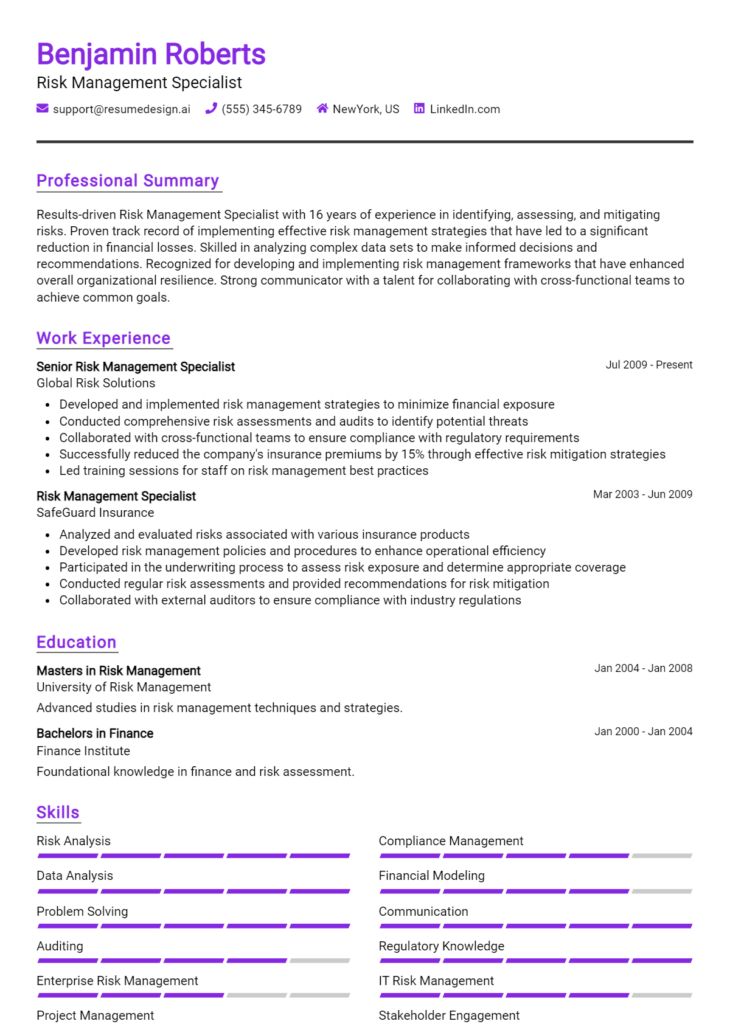Health Information Manager Core Responsibilities
A Health Information Manager plays a crucial role in managing and safeguarding patient data while ensuring compliance with healthcare regulations. This professional bridges various departments, such as IT, clinical, and administrative teams, requiring strong technical skills, operational knowledge, and effective problem-solving abilities. By leveraging these skills, a Health Information Manager enhances organizational efficiency and contributes to improved patient care. A well-crafted resume is essential to highlight these qualifications, showcasing the candidate's ability to meet the organization’s goals.
Common Responsibilities Listed on Health Information Manager Resume
- Oversee the management and security of patient health records.
- Ensure compliance with healthcare regulations and standards.
- Implement health information systems and technologies.
- Train staff on data management protocols and software usage.
- Analyze data for quality improvement and reporting purposes.
- Collaborate with clinical teams to enhance data accuracy.
- Conduct audits to ensure data integrity and confidentiality.
- Develop policies for information governance and data privacy.
- Manage electronic health record (EHR) systems.
- Coordinate with IT department for system upgrades and maintenance.
- Facilitate communication between departments regarding health information.
- Support research and clinical trials through data management.
High-Level Resume Tips for Health Information Manager Professionals
In the competitive landscape of healthcare, a well-crafted resume serves as a critical tool for Health Information Manager professionals seeking to make a lasting impression on potential employers. As the first point of contact between candidates and hiring managers, a resume must not only capture attention but also effectively convey a candidate's skills, achievements, and relevance to the role. An exceptional resume reflects a deep understanding of the healthcare industry and demonstrates the unique blend of technical knowledge and management capabilities essential for success in health information management. This guide will provide practical and actionable resume tips specifically tailored for Health Information Manager professionals, ensuring that your application stands out in this vital field.
Top Resume Tips for Health Information Manager Professionals
- Tailor your resume to the specific job description, using keywords and phrases that match the employer’s requirements.
- Highlight relevant experience in health information management, such as overseeing data integrity, compliance, and electronic health record (EHR) systems.
- Quantify your achievements with metrics, such as the percentage of improved data accuracy or reductions in processing time.
- Showcase industry-specific skills, including knowledge of healthcare regulations, coding standards, and information governance.
- Include certifications relevant to the field, such as Registered Health Information Administrator (RHIA) or Certified Health Data Analyst (CHDA).
- Use a clean, professional format with clear headings and bullet points to enhance readability.
- Incorporate a summary statement that clearly articulates your career objectives and key qualifications.
- Emphasize soft skills, such as leadership, communication, and problem-solving abilities, that are crucial for managing health information teams.
- Keep your resume concise, ideally one page, while ensuring that it includes all pertinent information.
- Proofread your resume to eliminate any errors in spelling, grammar, or formatting that could detract from your professionalism.
By implementing these tips, Health Information Manager professionals can significantly increase their chances of landing a job in this dynamic field. A tailored, achievement-focused resume not only showcases your qualifications but also conveys your commitment to excellence, making you a compelling candidate for potential employers.
Why Resume Headlines & Titles are Important for Health Information Manager
In the competitive field of health information management, a well-crafted resume headline or title can make a significant difference in capturing the attention of hiring managers. A strong headline serves as a succinct summary of a candidate's key qualifications and professional identity, allowing them to stand out in a crowded job market. It should be concise, relevant, and directly aligned with the job being applied for, providing an immediate insight into the applicant's expertise and suitability for the role. A compelling resume headline can entice hiring managers to delve deeper into the resume, increasing the chances of securing an interview.
Best Practices for Crafting Resume Headlines for Health Information Manager
- Keep it concise: Aim for one impactful phrase that summarizes your qualifications.
- Be specific: Tailor the headline to reflect the health information management role you are applying for.
- Highlight key skills: Focus on your most relevant skills and experiences that align with the job description.
- Use action verbs: Begin with strong action verbs to convey energy and proactivity.
- Include certifications: Mention any relevant certifications or credentials if applicable.
- Avoid jargon: Use clear language that is easily understood by hiring managers.
- Make it memorable: Craft a headline that resonates and sticks in the mind of the reader.
- Update regularly: Revise your headline to keep it fresh and relevant for each new application.
Example Resume Headlines for Health Information Manager
Strong Resume Headlines
Innovative Health Information Manager with 7+ Years of Experience in Data Analytics and Compliance
Certified Health Information Manager Specializing in Electronic Health Record Implementation
Dynamic Leader in Health Information Management with Proven Track Record of Enhancing Patient Data Integrity
Results-Driven Health Information Professional with Expertise in HIPAA Compliance and Data Governance
Weak Resume Headlines
Health Information Manager Looking for a Job
Resume for Health Information Manager Position
Experienced Individual Seeking Opportunities
The strong headlines are effective because they immediately convey specific qualifications, relevant experience, and a focus on impactful results that are attractive to potential employers. They communicate not just what the candidate does, but how they excel in their role. In contrast, the weak headlines fail to impress as they lack specificity and do not provide any insight into the candidate’s actual skills or achievements. These generic phrases do little to differentiate the candidate from others, making it less likely that hiring managers will take notice.
Writing an Exceptional Health Information Manager Resume Summary
A well-crafted resume summary is crucial for a Health Information Manager, as it serves as the first impression a candidate makes on hiring managers. This brief yet powerful statement quickly captures attention by showcasing key skills, relevant experience, and notable accomplishments that align with the specific requirements of the role. An impactful summary should be concise, compelling, and tailored to the job description, providing a snapshot of the candidate's qualifications and setting the stage for the rest of the resume.
Best Practices for Writing a Health Information Manager Resume Summary
- Quantify achievements to demonstrate impact, such as improvements in data accuracy or efficiency.
- Highlight relevant skills, including knowledge of healthcare regulations, electronic health record (EHR) systems, or data analysis.
- Tailor the summary to the specific job description, using keywords that match the employer's needs.
- Keep it concise, ideally between 2-4 sentences, to maintain the reader's attention.
- Showcase leadership or project management experience, especially if applicable to the role.
- Emphasize collaboration skills, as working with healthcare teams is often essential in this position.
- Use action verbs to convey a sense of proactivity and results-driven mentality.
- Avoid jargon and overly technical language that may not resonate with all hiring managers.
Example Health Information Manager Resume Summaries
Strong Resume Summaries
Detail-oriented Health Information Manager with over 7 years of experience improving data accuracy by 30% through the implementation of EHR systems and staff training programs. Proven track record of collaborating with medical teams to enhance patient record management.
Results-driven Health Information Manager skilled in data governance and compliance, achieving a 25% reduction in audit discrepancies over the past year. Expertise in leading interdisciplinary teams to optimize health information processes.
Dynamic Health Information Manager with a strong background in health data analytics, successfully increasing departmental efficiency by 40% through process improvement initiatives and technology integration. Committed to maintaining high standards of data integrity and security.
Weak Resume Summaries
Experienced Health Information Manager looking for a new job in a healthcare setting. Has knowledge of data management.
Health Information Manager with a background in healthcare. Good at teamwork and handling information.
The strong resume summaries are effective because they quantify achievements, highlight specific skills, and directly relate to the responsibilities of a Health Information Manager. They provide clear evidence of the candidate's impact and relevance to the role. In contrast, the weak summaries are vague and generic, lacking specific outcomes and failing to convey the candidate's unique qualifications or contributions, making them less compelling to hiring managers.
Work Experience Section for Health Information Manager Resume
The work experience section of a Health Information Manager resume plays a pivotal role in demonstrating the candidate's qualifications and suitability for the position. This section highlights the technical skills essential for managing health information systems, such as proficiency with electronic health records (EHR) and data analytics software. Additionally, it showcases the candidate's capacity to lead and manage teams effectively, ensuring compliance with healthcare regulations while delivering high-quality health information products. To make a compelling case for their candidacy, it is crucial for applicants to quantify their achievements, illustrating their impact within previous roles, and to align their experiences with current industry standards.
Best Practices for Health Information Manager Work Experience
- Highlight technical skills relevant to health information management, such as EHR implementation and data management.
- Quantify achievements whenever possible, using metrics like improved data accuracy rates or increased efficiency.
- Showcase leadership skills by detailing experiences in team management and project oversight.
- Align your experiences with industry standards and regulations to demonstrate compliance awareness.
- Use action verbs to convey initiative and impact, such as "led," "developed," or "coordinated."
- Incorporate collaborative experiences, illustrating how you worked with interdisciplinary teams to achieve common goals.
- Include continuing education or certifications that enhance your technical expertise in health information management.
- Tailor your work experience descriptions to reflect the specific job requirements and responsibilities of the position you're applying for.
Example Work Experiences for Health Information Manager
Strong Experiences
- Led a successful implementation of a new EHR system across three departments, improving patient data retrieval time by 40% and reducing documentation errors by 25%.
- Managed a team of 10 health information professionals, overseeing their training and development, which resulted in a 30% increase in team productivity.
- Collaborated with IT and clinical staff to develop and execute a data integrity initiative, achieving a 50% reduction in data discrepancies within six months.
- Streamlined coding processes that enhanced billing accuracy, leading to a 15% increase in revenue collection for the organization.
Weak Experiences
- Assisted in managing health information systems.
- Worked on various projects related to data management.
- Helped train staff on new software.
- Participated in meetings to discuss health information issues.
The examples listed as strong experiences are considered robust due to their specific, quantifiable outcomes and clear demonstrations of leadership and collaboration. They provide tangible evidence of the candidate's impact on previous organizations. In contrast, the weak experiences lack detail and measurable results, making it difficult for potential employers to assess the candidate's contributions and effectiveness in past roles. Vague descriptions fail to convey a sense of achievement or expertise, which is crucial in the competitive field of health information management.
Education and Certifications Section for Health Information Manager Resume
The education and certifications section of a Health Information Manager resume plays a crucial role in establishing the candidate's professional foundation. This section not only showcases the academic qualifications that are essential for the role but also highlights industry-relevant certifications that demonstrate a commitment to ongoing professional development. By including relevant coursework, specialized training, and recognized certifications, candidates can significantly enhance their credibility and align their qualifications with the specific demands of the job. This not only reassures employers of the candidate's expertise but also reflects their dedication to staying current in a rapidly evolving field.
Best Practices for Health Information Manager Education and Certifications
- Include degrees from accredited institutions relevant to health information management, such as a Bachelor’s or Master’s in Health Information Management or Healthcare Administration.
- List industry-recognized certifications, such as Registered Health Information Administrator (RHIA) or Certified Health Data Analyst (CHDA), prominently to enhance credibility.
- Provide details on relevant coursework that aligns with the responsibilities of a Health Information Manager, such as health informatics, data management, and healthcare laws.
- Highlight any specialized training or workshops completed in areas like electronic health records (EHR) systems or compliance regulations.
- Use clear and consistent formatting to make this section easy to read and navigate, ensuring important qualifications stand out.
- Keep this section updated with any new certifications or courses completed to reflect a commitment to continuous learning.
- Consider including relevant volunteer experiences or internships that complement educational qualifications.
- Avoid overly technical jargon that may not be familiar to all hiring managers; instead, focus on clear descriptions of qualifications.
Example Education and Certifications for Health Information Manager
Strong Examples
- Bachelor of Science in Health Information Management, University of Health Sciences, 2020
- Registered Health Information Administrator (RHIA), American Health Information Management Association, 2021
- Certificate in Health Data Analytics, Online Institute of Health Education, 2022
- Coursework in Data Governance and Healthcare Compliance, University of Health Sciences, 2019
Weak Examples
- Bachelor of Arts in English Literature, University of Literature, 2015
- Certification in Basic First Aid, Red Cross, 2018
- Completed a workshop on Creative Writing, Local Community Center, 2020
- Associate Degree in Culinary Arts, Culinary Institute, 2016
The examples listed as strong showcase relevant degrees and certifications that are directly applicable to the role of a Health Information Manager, demonstrating a focus on healthcare and data management. In contrast, the weak examples highlight qualifications that do not relate to the field, indicating a lack of alignment with industry expectations and requirements. Strong educational backgrounds and certifications reinforce a candidate's suitability for the role, while irrelevant qualifications may detract from their overall profile.
Top Skills & Keywords for Health Information Manager Resume
In the evolving field of healthcare, the role of a Health Information Manager is crucial for ensuring the integrity, security, and accessibility of patient information. A well-crafted resume that highlights both hard and soft skills can significantly enhance a candidate's prospects in this competitive job market. Skills not only demonstrate a candidate's qualifications but also illustrate their ability to navigate the complexities of health information systems, regulatory requirements, and the interdisciplinary nature of healthcare teams. By showcasing relevant skills in a resume, candidates can effectively communicate their readiness to manage health information with accuracy and efficiency, which is vital for delivering quality patient care.
Top Hard & Soft Skills for Health Information Manager
Soft Skills
- Attention to Detail
- Critical Thinking
- Effective Communication
- Problem-Solving
- Team Collaboration
- Adaptability
- Time Management
- Leadership Skills
- Conflict Resolution
- Empathy
Hard Skills
- Health Information Systems (HIS)
- Medical Coding and Billing
- Data Analysis
- Regulatory Compliance (HIPAA, HITECH)
- Electronic Health Records (EHR) Management
- Clinical Documentation Improvement (CDI)
- Data Privacy and Security
- Health Informatics
- Quality Assurance
- Project Management
For more insights on how to showcase your skills effectively, consider exploring this comprehensive guide on skills. Additionally, if you need tips on emphasizing your work experience, there are valuable resources available to help you construct a compelling narrative for your resume.
Stand Out with a Winning Health Information Manager Cover Letter
Dear [Hiring Manager's Name],
I am writing to express my interest in the Health Information Manager position at [Company Name] as advertised on [where you found the job listing]. With a robust background in health information management, a Master's degree in Health Informatics, and over five years of experience in leading health data initiatives, I am excited about the opportunity to contribute to your team. My passion for optimizing patient care through effective data management aligns perfectly with your organization’s commitment to providing exceptional healthcare services.
In my previous role at [Previous Company Name], I successfully implemented a new electronic health record (EHR) system that improved data accuracy and accessibility, resulting in a 30% reduction in patient record retrieval time. I have a proven track record in ensuring compliance with HIPAA regulations and other healthcare standards, which has significantly enhanced the security and integrity of sensitive patient information. Furthermore, my experience in training and mentoring staff on health information systems has fostered a culture of data-driven decision-making within the organization.
I am particularly drawn to [Company Name] because of its innovative approach to health information management and dedication to improving patient outcomes through technology. I am eager to leverage my expertise in data analysis and project management to help streamline processes and enhance the quality of data used in clinical decision-making. I am confident that my proactive approach and strong analytical skills will make a valuable contribution to your team.
Thank you for considering my application. I look forward to the opportunity to discuss how my experience and vision align with the goals of [Company Name]. I am excited about the possibility of contributing to your organization and am eager to bring my skills in health information management to your esteemed team.
Sincerely,
[Your Name]
[Your Contact Information]
Common Mistakes to Avoid in a Health Information Manager Resume
Crafting an effective resume as a Health Information Manager is crucial in a competitive job market. Many candidates make common mistakes that can hinder their chances of landing an interview. Understanding these pitfalls can help you create a more compelling resume that highlights your qualifications and experience. Here are some prevalent mistakes to avoid:
Neglecting Relevant Certifications: Failing to include certifications such as Registered Health Information Administrator (RHIA) or Certified Health Data Analyst (CHDA) can make your resume less competitive.
Using Generic Job Descriptions: Listing generic responsibilities instead of specific achievements does not showcase your unique contributions to previous employers.
Omitting Technical Skills: In a technology-driven field, not highlighting your proficiency with Electronic Health Records (EHR) systems, coding software, and data management tools can be detrimental.
Lacking Quantifiable Achievements: Resumes that do not include measurable outcomes, such as "improved data accuracy by 25%," miss the chance to demonstrate the impact of your work.
Inconsistent Formatting: An unprofessional layout with inconsistent fonts, sizes, or spacing can distract hiring managers from your qualifications.
Ignoring Keywords: Failing to tailor your resume with industry-specific keywords can lead to it being overlooked by applicant tracking systems (ATS).
Including Irrelevant Work Experience: Listing unrelated job experiences without demonstrating how they apply to health information management can dilute your focus and relevance.
Not Customizing for Each Application: Sending out a one-size-fits-all resume neglects the opportunity to address specific job requirements and company culture, which can significantly weaken your application.
Conclusion
As a Health Information Manager, you play a crucial role in ensuring the accuracy, confidentiality, and security of patient records. Your responsibilities include managing health information systems, ensuring compliance with regulations, and overseeing the coding and billing processes. To excel in this position, it's essential to possess a strong understanding of health information technology, data management skills, and the ability to communicate effectively with various stakeholders in the healthcare sector.
In the ever-evolving field of health information management, staying updated with the latest trends and technologies is vital. This not only enhances your skill set but also increases your marketability to potential employers. Networking with industry professionals and participating in relevant training can further enhance your qualifications.
Now is the perfect time to review your resume to ensure it effectively showcases your skills and experiences as a Health Information Manager. Highlight your achievements and the specific competencies that make you a valuable asset in the healthcare industry. To assist you in this process, consider utilizing various resources designed to enhance your job application materials.
You can access resume templates to create a visually appealing and organized resume. If you need more personalized assistance, try the resume builder to guide you step-by-step in crafting a standout resume. Additionally, explore resume examples for inspiration on how to present your qualifications effectively. Don’t forget to complement your resume with a compelling cover letter—check out the available cover letter templates to help you make a strong first impression.
Take action today by reviewing and updating your Health Information Manager resume. Your next career opportunity is just around the corner!

